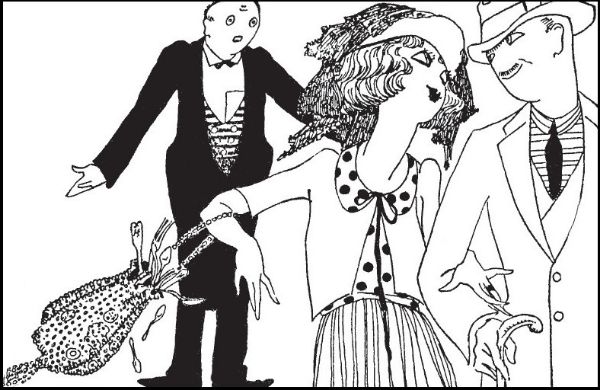At a former restaurant job, we used an antique ashtray and a vintage sterling silver jewelry case to present the check. The shape of each resembled the logo of the restaurant and guests were always charmed by them when they asked for the bill. The restaurant was quite tiny, appointed with a lot of carefully curated barware. The cutlery was adorned with mother of pearl handles. We were surrounded by a lot of precious things, which meant that many of those precious things would often mysteriously disappear. Management would blame the staff when silverware went missing but, most of the time, we all knew the stolen items were ending up in guests’ pockets and handbags. To many restaurants, theft is considered part of the cost of doing business.
There were less than twenty seats in this restaurant, and I guarded the vintage items fastidiously. I knew I had to retrieve the check immediately or risk having them stolen. Kleptomaniacs are a clever sort, so we had to be vigilant. The garnish picks were the hardest to police. We ordered them in small batches from Etsy, by an artisan who made each one uniquely by hand. Each pick cost at three to five dollars wholesale. We would lose about ten to fifteen of them every few weeks. I saw a woman at my table use it as a hairpin before I went over to the table to ask her to return it. “Oh… but these are so cute. Can’t I just take one??” she said with an air of entitlement.
The night the antique ashtray disappeared, I noticed the woman at my table coveting it as she signed her bill. She kept telling her boyfriend how it reminded her of something in her grandmother’s summer house. I turned around for a split second to confirm a drink order with the bartender, and when I turned back she was gone and so was the ashtray. A month later the jewelry box was stolen too.

These weren’t extremely valuable items but, because they were vintage, they were difficult to replace. Restaurant guests who steal are usually small time crooks. Waiters guard their pens like family heirlooms because they’re accustomed guests pilfering them. Recently, a guest signed his check and took my sturdy Parker Jotter pen that the restaurant provides in limited quantities and left me his cheap plastic pen with a corporate logo. I try my best to surveil my tables but, even if someone swipes your pen, it’s difficult to confront them about it without seeming like you’re being petty. “I just paid hundreds of dollars for dinner and you chased me down for a measly pen?” they might wonder. It’s a flawed mentality though because in many ways they’re stealing part of the server’s uniform.
Why do so many guests feel so entitled to steal things from restaurants? None of these people wouldn’t dare be so cavalier about pocketing goods from a retail store of any kind. Purchasing twenty dollars worth of toiletries wouldn’t embolden someone to swipe a keychain at the the checkout counter on his way out of the drugstore. Few people would ever walk into their lawyer’s office and nab his stapler just because they were billed three thousand dollars last month. Yet many diners inexplicably feel entitled to repossess whatever amenities they please. I’ve had people jokingly ask, “I really like this glass, what would you do if I took it?” They ask this question flippantly because they know that a server would never have the gall to say “I’d probably call the police.” When guests frame the question like this, it shifts the guilt onto the servers as though their criminal impulses are normal and servers policing them would not be.
There’s something so much deeper going on when guests steal things from restaurants. On a subconscious level, it belies a greater issue within many restaurant guests that part of the hospitality experience is to excuse the occasional indiscretion. In other words, part of caring for their needs is an expectation that we will turn a blind eye to inappropriate behavior, even stealing.
In an effort to manage inventory and deter theft, many restaurants force their staff count valuable items like leather-bound menus or flatware on a nightly basis. But those same restaurants balk at charging guests for the items they stole when they catch them red-handed. Too often, when theft occurs, the staff is blamed for its lack of vigilance. But waitstaff are too busy to be crimebusters.
As with most guest transgressions in hospitality, avoiding confrontation is paramount and standing up for what is right can be fraught. The risk of offending a guest (even the kleptos) isn’t worth the cost of replacing the stolen property. It’s unfortunate because a restaurant staff member confronting a guest who has just stolen something shouldn’t be considered inhospitable, it should be inarguably justified.



